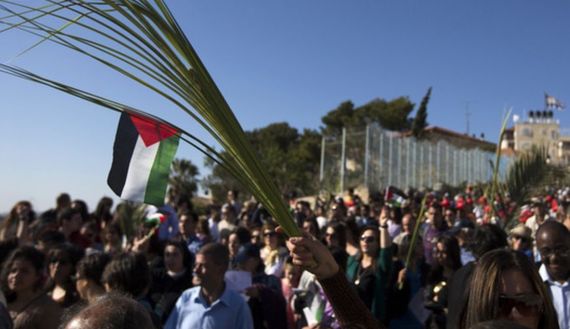BETHLEHEM (Ma’an) — Palestinian Christian groups in Jerusalem have launched a campaign condemning Israeli restrictions on freedom of worship in advance of Easter, as some fear a repeat of the police violence the holy city has witnessed in years past.
Produced by the local Palestinian organization Ma’an for Development and Progress in the Christian Quarter with the support of a number of Christian Jerusalem youth groups, a new video calls for “freedom of worship for all” in Jerusalem.
“Christians are the indigenous inhabitants of this land and all we want is to be able to worship freely and normally in our holy sites,” Benayot Benayot, a member of the group that produced the video, said in a telephone interview.
“There is no more freedom for Christians in reaching the Church of the Holy Sepulchre,” Benayot added, stressing how the combination of checkpoints and police violence had deterred many Christians from coming during the holy week leading up to Easter.
Every year, millions of Christians — including tens of thousands of Palestinian Christians — converge upon the holy city to mark the holiest days of the Christian calendar.
In recent years, however, these celebrations have been marred by violence, and at times Israeli authorities have even banned Palestinian Christians from entering the city to celebrate their holidays, even while allowing foreign pilgrims in.
Benayot said that last year when he tried to go to the Church of the Holy Sepulchre, he was assaulted at a checkpoint Israeli forces had erected.
“They arrested me, beat me and took me away when I went to go the church with my family and my children,” Benayot said, condemning the “brutal” attacks by the police he and other Christians were subjected to last year as they attempted to reach the holy sites.
“Families have stopped coming here for the holy days because they are afraid of what will happen if they try,” he added.
Palestinians also charge that Israeli authorities have also erected large numbers of police checkpoints around the Old City of Jerusalem during the festivities, which attracts a large percentage of the 200,000-strong Palestinian Christian community.
“Jerusalem has changed so much that it is difficult for me to see it anymore,” Benayot said.
‘Persecution against Christians and Arabs is always there’
Amid scenes of police violence against worshipers during last year’s Easter ceremonies, the video highlights policies it says are designed to limit Christian access to their sites of worship and interviews a number of prominent Palestinian Christian leaders.
Issa Kassissieh, the Palestinian ambassador to the Holy See, argued that there is “systematic policy” to prevent Christian worship that has escalated in the past three years.
During Easter last year, Kassissieh recounted, “the rooftop of the Church and courtyard were empty, except for checkpoints and police,” even while many worshipers were stuck at checkpoints nearby.
Ibrahim Faltas, the General Administrator of the Custody of Holy Land, stressed that the restrictions imposed upon Christians are not, however, limited to Easter time, but reflect wider Israeli policies against Palestinians in Jerusalem.
“Persecution against Christians and Arabs is always there,” he said, adding that he believed Easter week was “targeted” because it was the most visible demonstration of Christian presence during the year.
In a report published in 2012, the US State Department highlighted Israeli restrictions on the freedom of worship of Palestinians, Christians and Muslims alike.
“Strict closures and curfews imposed by the Israeli government negatively affected residents’ ability to practice their religion at holy sites, including the Church of the Holy Sepulchre and Al-Aqsa Mosque in Jerusalem, as well as the Church of the Nativity in Bethlehem,” the report said.
“The separation barrier significantly impeded Bethlehem-area Christians from reaching the Church of the Holy Sepulchre in Jerusalem and made visits to Christian sites in Bethany (al-Eizariya) and Bethlehem difficult for Palestinian Christians who live on the Jerusalem side of the barrier.”
A statement released last week signed by major Palestinian Christian organizations in occupied East Jerusalem tied these restrictions into the official Israeli policy of “Judaization” in Jerusalem.
“The occupation authorities want to negate Christian presence and create the impression of a Jewish-only city,” the statement said.
‘We live here and will remain here steadfast’
The policy of Judaization also involves the denial of construction and long-term residency permits to Palestinian residents while allowing the construction of thousands of settlement homes for Jews in order to shift the demographic balance.
Since Israel first occupied East Jerusalem in 1967, authorities have also increasingly separated the holy city from the surrounding Palestinian West Bank through a system of permits, checkpoints, and a separation wall that have cut the city off from its historic hinterland.
Strict quotas for permits for West Bank Palestinians to enter Jerusalem mean that very few are able to regularly enter the city, including the more than 50,000 estimated West Bank Christians.
The result of these policies has been an effective, albeit gradual, population shift, as thousands of Palestinians have been pressured or forced to leave Jerusalem.
Despite this, Christian Palestinian leaders in Jerusalem remain determined to maintain their presence in the holy city and protect their freedom of worship.
“I see myself and all of us, the Christian families in Jerusalem, as the guardians and protectors of the Holy Land and the custodians of the holy places,” Issa Kassissieh, the Palestinian ambassador to the Vatican, said in the video.
“We live here and will remain here steadfast.”














